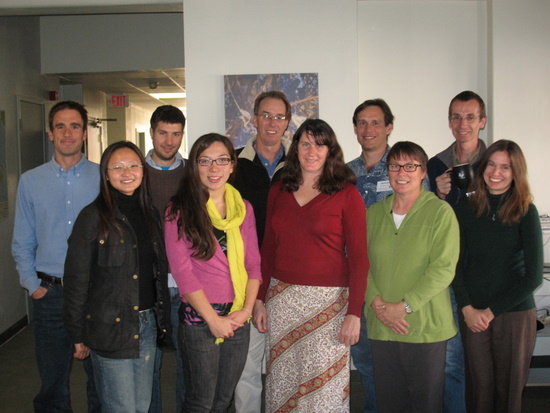NCEAS Working Groups
Tropical coral reefs of the future: Modeling ecological outcomes from the analyses of current and historical trends
Project Description
Shallow water reef corals deposit calcium carbonate skeletons that collectively form massive three-dimensional structures known as coral reefs. A huge number of plants and animals call these structures home, and these tropical marine ecosystems make a significant contribution to the economies of many nations through tourism, fishing and coastline protection. Over the past half century, climatic conditions, pollution and over fishing have severely damaged the integrity of many coral reefs across the globe and pessimists believe that these ecosystems could disappear completely in the next 100 years. Evidence from present-day and fossil reef communities, however, suggests that some corals and reef communities persist and even thrive in environmental conditions that cause others to die. Yet the factors that make a given coral or coral reef community resistant or sensitive to stress, or better or less able to recover from disturbance, are not well understood.
Our working group brings together scientists from the United States, Australia, Taiwan, France, and Kenya to: 1) synthesize data and identify coral species that are better able to withstand or recover from stress and define the organismic and genetic traits that characterize these species, and 2) identify coral communities and the physical features of their habitats that are associated with resistance to disturbance. We will use this information to forecast the structure, function and ecosystem services of reef communities in a future strongly influenced by climate change (warming and ocean acidification).
Fringing reefs such as this one in Moorea, French Polynesia (photographed in April 2010), represent one of the most diverse ecosystems on our planet. Human and natural disturbances over the last few decades, including the effects of climate change, may push them to extinction. This working group seeks to determine whether an alternative outcome might exist, at least for a period of time, in which dramatically different reefs are ecologically dominated by a subset of corals that are resistant to environmental assault.
UPDATE: October 2013
Our working group has been highly productive this past year with two pending publications and the leadership to two NSF Earth Cube end user workshops for the coral reef systems community. In addition based on the work and ideas from this working group, the $10,000 top prize of the Paul G. Allen Ocean Challenge was awarded to PI Ruth Gates and working group participant, Madeleine van Oppen from the Australian Institute of Marine Science, for their idea to increase the resilience of critical and highly vulnerable coral reef ecosystems.
This work is supported by the National Center for Ecological Analysis and Synthesis, a Center funded by NSF (Grant #EF-0553768), the University of California, Santa Barbara, and the State of California.

Principal Investigator(s)
Peter J. Edmunds, Ruth D. Gates
Project Dates
Start: October 1, 2010
End: August 31, 2012
completed
Participants
- Mehdi Adjeroud
- Institut de Recherche pour le Développement
- Marissa L. Baskett
- University of California, Davis
- Julia K. Baum
- University of California, Santa Barbara
- Iliana B. Baums
- Pennsylvania State University
- Lorenzo Bramanti
- California State University, Northridge
- Ann F. Budd
- University of Iowa
- Scott Burgess
- University of California, Davis
- Robert Carpenter
- California State University, Northridge
- Peter J. Edmunds
- California State University, Northridge
- Nicholas S. Fabina
- University of California, Davis
- Tung- Yung Fan
- National Museum of Marine Biology and Aquarium
- Amanda Fishbin
- Erik Franklin
- University of Hawaii
- Ruth D. Gates
- University of California, Santa Barbara
- Kevin Gross
- North Carolina State University
- Xueying Han
- University of California, Santa Barbara
- Lianne Jacobson
- California State University, Northridge
- Chandler Jennings
- Sarah Kaufman
- James S. Klaus
- University of Miami
- Michael Lesser
- University of New Hampshire
- Timothy R. McClanahan
- Wildlife Conservation Society Kenya
- Jennifer K. O'Leary
- University of California, Santa Barbara
- Xavier Pochon
- University of Hawaii, Mānoa
- Hollie M. Putnam
- University of Hawaii
- Tyler B. Smith
- University of the Virgin Islands
- Michael Stat
- University of Hawaii, Mānoa
- Madeleine J.H. van Oppen
- Australian Institute of Marine Science
- Robert van Woesik
- Florida Institute of Technology
- Chris Wall
- California State University, Northridge
- Denise Yost
- Hawaii Institute of Marine Biology
Products
-
Journal Article / 2014
Response diversity can increase ecological resilience to disturbance in coral reefs
-
Journal Article / 2014
Evaluating the causal basis of ecological success within the Scleractinia:An integral projection model approach
-
Journal Article / 2014
Persistence and change in community composition of reef corals through present,past and future climates
-
Journal Article / 2012
Transmission mode predicts specificity and interaction patterns in coral-symbiodinium networks
-
Journal Article / 2015
The differential effects of increasing frequency and magnitude of extreme events on coral populations
-
Journal Article / 2011
GeoSymbio: A hybrid, cloud-based web application of global geospatial bioinformatics and ecoinformatics for Symbiodinium-host symbioses
-
Data Set / 2011
GeoSymbio: Symbiodinium-host symbioses
-
Data Set / 2011
GeoSymbio: Symbiodinium-host symbioses
-
Journal Article / 2015
Stability of Caribbean coral communities quantified by long-term monitoring and autoregression models
-
Data Set / 2011
Expert opinion on coral tolerance, recovery, and resilience
-
Data Set / 2011
Long term coral cover changes from six sites around the world
-
Journal Article / 2013
Convergent mortality responses of Caribbean coral species to seawater warming
-
Journal Article / 2015
Building coral reef resilience through assisted evolution
-
Journal Article / 2012
Hosts of the Plio-Pleistocene past reflect modern-day coral vulnerability
